Shaka When the Walls Fell: The Brunnen-G When They Sang “Yo-Way-Yo”
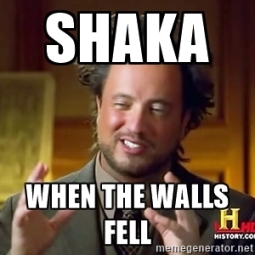
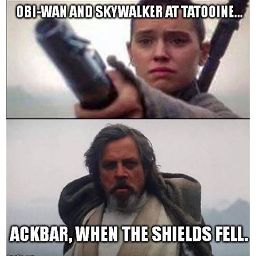
I’m not a Trekkie so I had to google it. You know? That meme: “Shaka When the Walls Fell.”
Turns out it comes from a really clever Star Trek: The Next Generation episode where the universal translator for once doesn’t work because the aliens talk crap all the time in allusions (link).
So, if you are a Tamarian, you don’t say, “I am feeling depressed because my girlfriend dumped me.” Instead, you say, “Rastar when she wandered alone and rejected.”
Cute idea that makes a good point: Literal — word for word — translations aren’t always very useful. For example, in medieval King Arthur stories you might find people’s kidneys yearning for each other. A better translation might be “heart.”
(It rather breaks down when you imagine the day-to-day. How does one say, “Mummy, can I have a drink of water?” Or, “Please adjust the size by 5mm.” And what did the people of Shaka say when the walls came down? But then, I am not a Trekkie.)
This is just one episode in a really big fat franchise, but it’s the one people make memes of, and I don’t think it’s because of the interesting angle on xeno-linguistics. Nor do I think it’s about the humor. There’s something about the way those lines resonate.
One line from one episode out of nearly 200. It doesn’t describe onscreen drama; it all happened offscreen long ago. Nor does it relate to the serial characters or their culture, the Federation.
So, though it’s a script-writing win, it also arguably points to a series-building fail. The aliens of the week are more resonant than the entire crew and their story.
Now, who remembers Lexx?
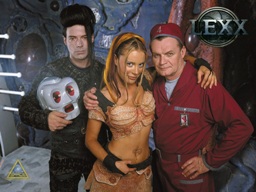
The amazing first season is like “Paul Verhoven does a Monty Python edit of an attempt by Scott Westerfeld at a Farscape script, with added eroticism.” The subsequent seasons are more like Red Dwarf‘s raunchy cousin. However, what people remember is The Battle Hymn of the Brunnen-G in the opening of Episode 1. If you haven’t heard it, skip over to Youtube and take a look.
Later, we get the backstory. The Brunnen-G were a romantic race of warrior poets who became just poets. One day, a dark empire threatened their planet. A band of young men hauled some antique fighters out of a museum and made a last stand. As they hurtled to their deaths, they sang the ancient battle anthem:
Yo Way Yo, Home Va-Ray,
Yo Ay-Rah, Jerhume Brunnen-G
Yo Way Yo, Home Va-Ray,
Yo Ay-Rah, Jerhume Brunnen-G
Yo Ay-Rah, Jerhume Brunnen-G
(source)
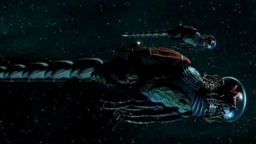
That was in the first couple of minutes of a multi-season series, but it’s what people remember. Lexx is nearly two decades old, but that song still gets sung at conventions.
This is one up on Star Trek: TNG. We actually see the last stand! It casts a dramatic shadow over the saner bits of the series and makes Kai — the undead last of the Brunnen-G — such a memorable character. However, the series wasn’t the Brunnen-G chronicles.
Now go back to the Star Wars version of the meme:
Obi-Wan and Skywalker at Tatooine
Ackbar, when the shields fell.
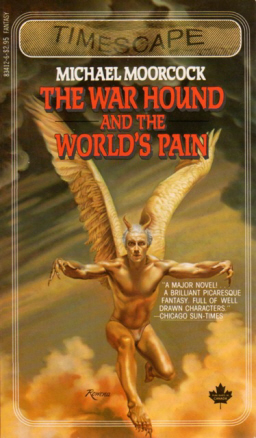
Both of these refer to actual events in the Star Wars saga. Not just events but emotionally resonant moments we like to recall. For example, (Admiral) Ackbar, when the shields fell.
Even before all this, Star Wars was one huge meme factory. People quote it the way they used to do Shakespeare. For example, when a burly friend showed off his very thick quilted early medieval armor, I quipped “That’s no moon…” And we’ve all said, “I sense a disturbance in the Force.”
This tells me two things.
First, movies are generally better at generating resonant moments than series are. Partly it’s down to budget. Mostly, though, it’s to do with the diverse ramifications of length.
A film is of a known length. A series is of an indeterminate length.
Thus as an audience, we know when a film reaches a climax, but not when a series does. Last season’s downbeat end-of-season teaser may turn out — in hindsight — to be the series finale. Not only do we not know how to interpret what we are watching as we watch it, but we are also aware that the significance may result from non-dramatic considerations, typically an actor leaves or the network kills the show.
This indeterminacy must also put a constraint on the creators.
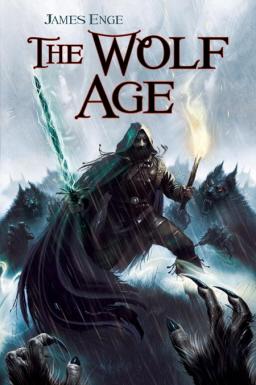
Remember how J. Michael Straczynski thought Season 4 of Babylon 5 was the last? He pretty much brought all the threads to satisfying conclusions. Then they gave him money for Season 5. It was as if Jimi Hendrix just staggered off stage, broken guitar in his hands, behind him roadies applying fire extinguishers to the burning amplifiers, and the manager says, “You have to do an encore.”
There’s therefore a natural reluctance to break the setting or change a working format… in other words burn cities or blow up Death Stars.
A film is also much shorter than a series.
It needs to provide just three or four high points, not dozens. The film can build up to each high point, which will really stand out, whereas a series must engage the viewer hour-by-hour. All those moments, no matter how brilliant, will serve to dilute each other in the memory.
Finally, being the shorter of the two, the film is easiest to rewatch and rewatch. How many times have you seen the original Star Wars? Most of us almost know the script by heart.
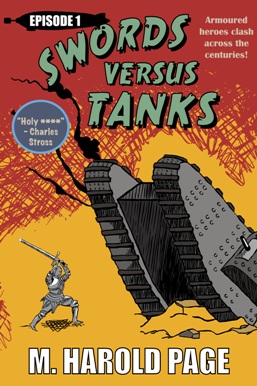
Second, it really is easier to come up with resonant stories when you are not worried about dramatising them. It’s easier to reference Shaka when the walls came down, than to make a TV series around it.
We see this all the time in books.
For example, in Michael Moorcock’s The War Hound and the World’s Pain, the protagonist — a 30-Years-War mercenary, by the way, you really have to read this book! — quests through the multiverse and hits us with memorable concepts, for example the city where the only law is “no stealing” (given that murder is stealing a life, lying is stealing freedom of action…), but never really explores them.
This is a pity because, where writers come up with crazy/cool stuff and actually make it work as a story, the resulting book stays with us.
Take Poul Anderson’s High Crusade, for example, where a medieval lord and his retinue hijacks an alien ship, then carves out a Galactic empire. Or, nearer to home, James Enge’s Wolf Age, set in a city entirely inhabited by a werewolf civilization. It’s also how Hitchhiker’s Guide to the Galaxy works; a rhythm of throwaway creativity that then pays off.
And if course, it’s why I wrote Swords Versus Tanks. In hindsight, perhaps that high concept was a bit too nuts for general consumption…
M Harold Page is the Scottish author of works such as Swords vs Tanks (Charles Stross: “Holy ****!”). For his take on writing, read Storyteller Tools: Outline from vision to finished novel without losing the magic. (Ken MacLeod: “…very useful in getting from ideas etc to plot and story.” Hannu Rajaniemi: “…find myself to coming back to [this] book in the early stages.”)
I remember Lexx! Although I’d prefer to forget the fourth season …
And there was a time when my friends & I could come awfully close to having an entire, intelligible conversation using nothing but Simpsons quotes. For better or for worse, those days (like the Simpsons’ best days) are behind us now.
But don’t series that have already been embraced have the benefit of still being liked/watched/read/purchased even if the episodes/installments/books are falling flat. Or to put it another way, once you have a well-liked series, you can phone it in here and there, because you’ve got people committed.
I’m not much of a Trekkie myself, but did watch and love most of ST:TNG. However, I hated, absolutely hated, the holodeck episodes, even the Sherlock Holmes episodes.
Oh, and the situation with B5 was a bit more complicated — Straczynski had always wanted to do a 5 year show. Then, when it looked like it’d end at 4, he did some major shifting to resolve the major threads in S4, which meant that most of S5 was what would’ve been side stories spread through S4 and S5. So Hendrix was told to cut his set short, set things on fire & staggered off stage, and THEN was shoved back on for an encore.
@Joe H: We didn’t watch season4!
@NOLAbert: Yes. And to be fair, perhaps series create resonant *characters* rather than moments.
@Joe H. I did simplify somewhat. Yes.
LEXX LIVES!!!!
Yo Ay-Rah, Jerhume Brunnen-G!!!!
I would recommend against watching Lexx S4. It did the unfortunate thing where they brought everyone to Earth; was mostly of interest because it featured Lister from Red Dwarf.
But now I want to go rewatch the first three seasons.
M Harold Page,
Maybe this is the exception rather than the rule. But one of the most resonant moments in a series: The Red Wedding.
Did you folks across the pond catch President Obama’s speech at the traditionally humorous White House Correspondents’ Dinner? Most of the Republican Senators stonewalling his Supreme Court nominee, Merrick Garland, were attending, and he joked, rather grimly: You know who you are, Republicans. In fact I think we’ve got Republican senators Tim Scott and Cory Gardner, they’re in the house, which reminds me — Security, bar the doors! Judge Merrick Garland, we’re gonna do this right here, right now. It’s like the Red Wedding. I expect the Red Wedding will go on having that kind of currency for decades, even with people who never experience either version of GRRM’s series. The HBO series title alone has crossed into political use, as when a purported Trump campaign insider said of the conflicts among the different factions on the transition team, “It’s Game of Thrones in there.”
When I was a kid, my parents, and baby boomers who had grown up on Westerns generally, would refer to really messed up situations as “a bad day at Black Rock,” after a movie so named. Once a critical mass of my friends had been to Burning Man, I had to make a conscious effort to drop the old expression. No doubt there still are bad days at Black Rock, but they don’t look anything like a gunslinging Western in black and white.
Joe: Yes, LEXX season 4 was when the producers just seemed to lose interest–as if they never expected it to last that long and they were just sick of trying to top themselves, so they said “let’s fuck it all up now.” The fourth season is as terrible as the first three are brilliant. I’d agree that it can be skipped, but LEXX fanatics will want to see it just for the few bright moments in the dissolution of what was a fantastic show for a many years.
@Sarah YES. I think Red Wedding shows how it’s done: establish something the viewers engage with, then blow it all up but in ways that aren’t arbitrary or attributable to one or two actors wanting more money and then leaving.
I think the point about how differently we interact with serialized works versus shorter, often one off works is interesting. I wonder if the same general idea could be applied to book series compared to stand-alone novels. I know at least in the case of GRRM, I was much more impacted at the end of the first book than by anything in the later ones (including a certain wedding).
That said, I do have one minor (and good-natured!) quibble. I feel like your particular choice of line could be going after some low hanging fruit for your argument about it representing a series-building fail. The episode the line comes from, as you say, has a creative premise. But aside from that it’s just terrible television (and this is coming from a fan). It was from the early years of the show and they were still getting a feel for the characters and, you know, trying to write dialogue that didn’t sound like it was spouted by a formalizatron 5000 (patent pending).
My point is, I think if you had gone after another incredibly famous line that has spawned its own assembly of riffs, t-shirts, and pop culture references, you wouldn’t have had quite such an easy time poking holes in its importance to the series. It’s a line that speaks to Picard’s character and many of the ideals that the federation is meant to represent: “There … are … four … lights!”
@drazel42:
> I wonder if the same general idea could be applied to book series compared to stand-alone novels.
Good point. I think it’s the big format shifts that stick. Red Wedding was famous before the TV show. Bits of Harry Dresden also… e.g. when he quasi-died.
> That said, I do have one minor (and good-natured!) quibble.
Beowulf, when he tore off Grendel’s arm and nailed it to the eaves…